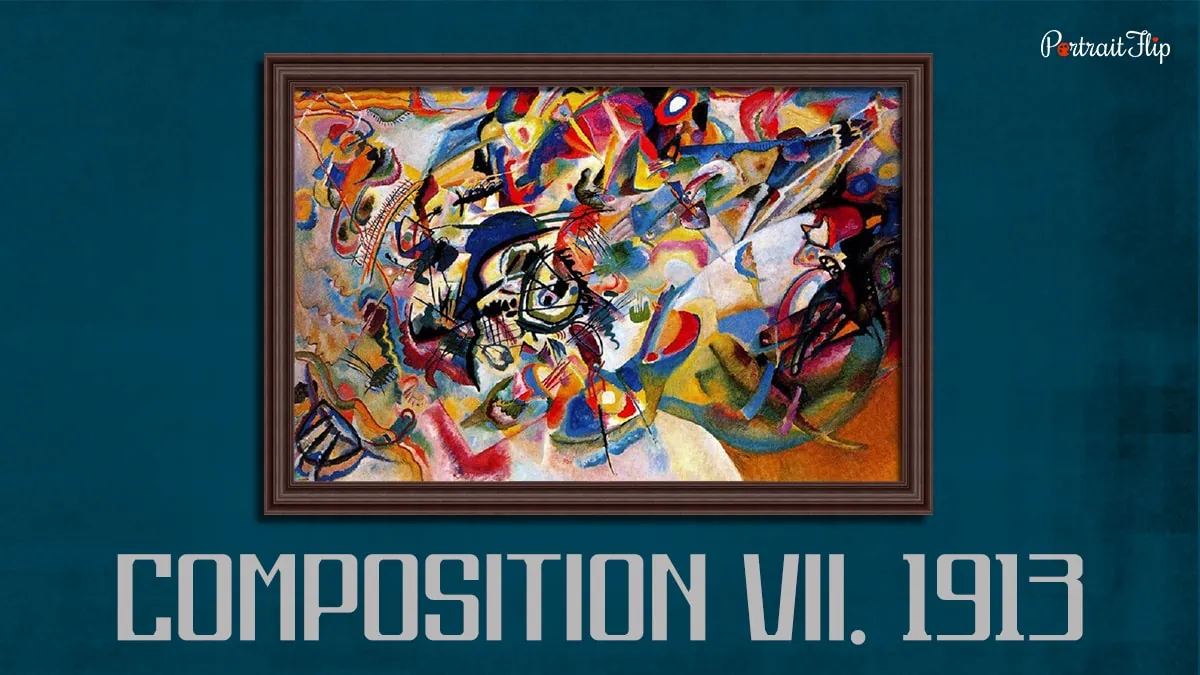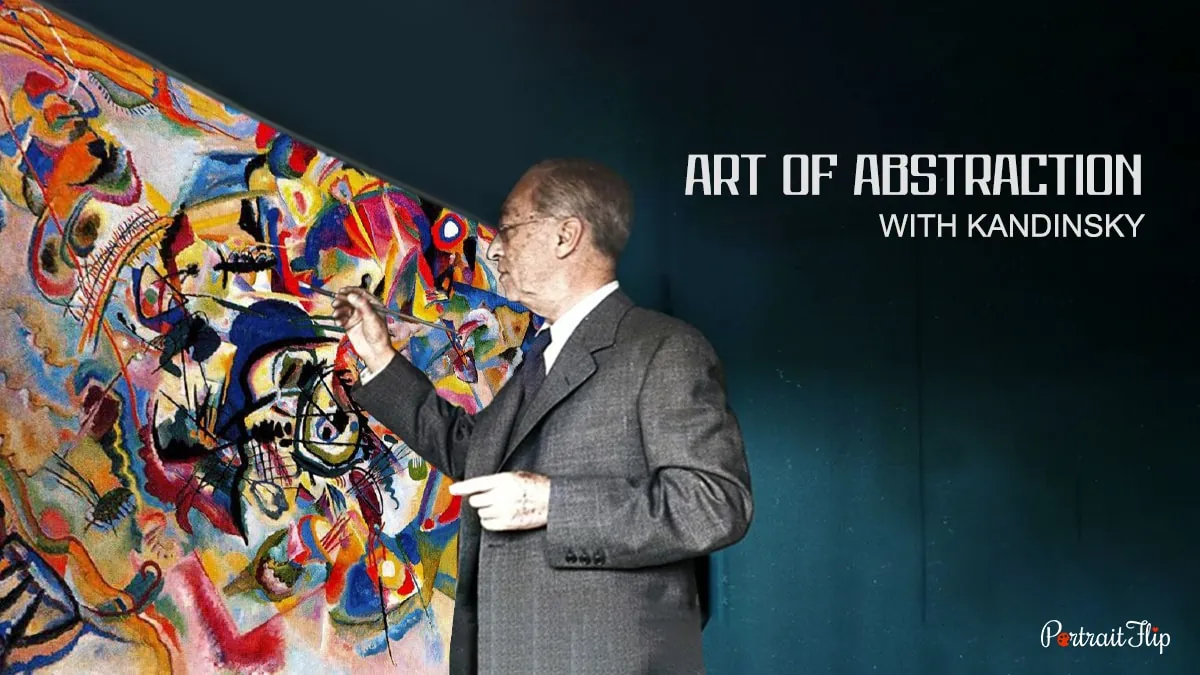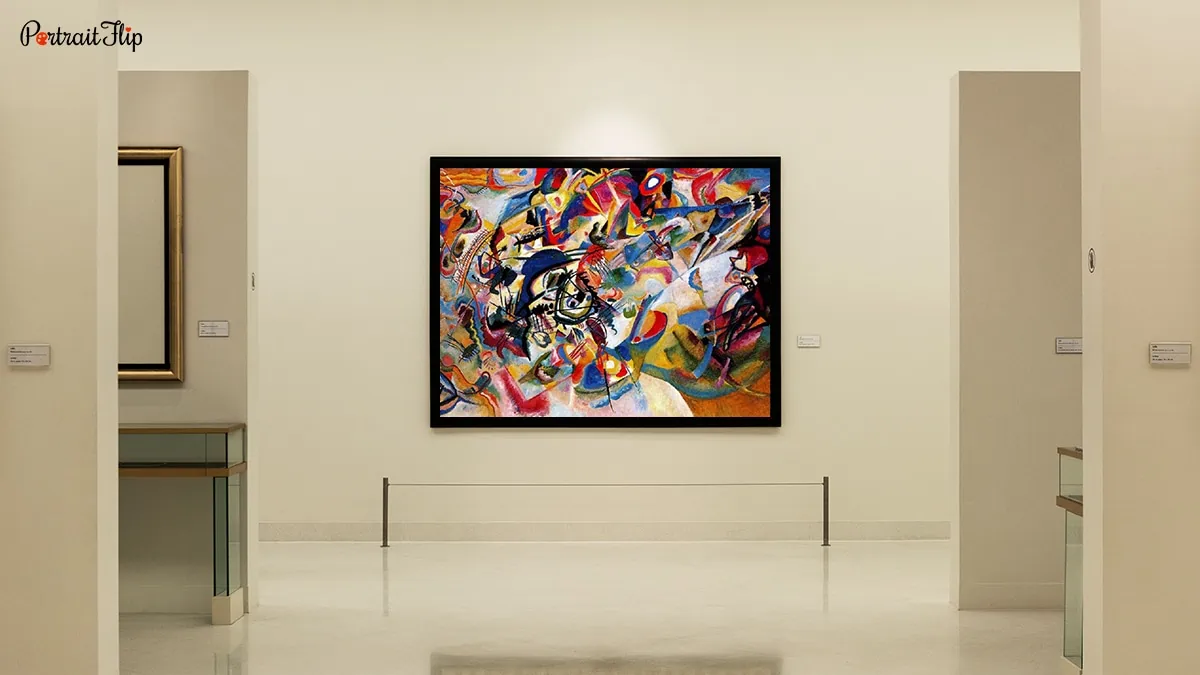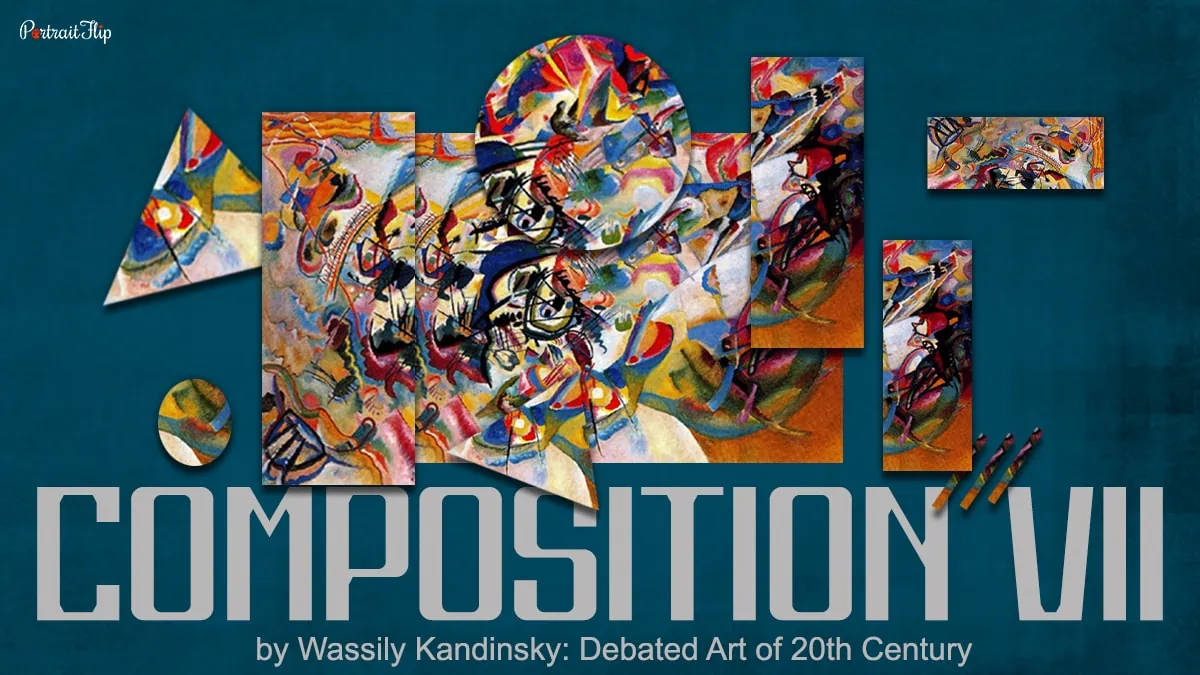Have you ever wondered what it must be like to listen to the sounds of color?
You are probably thinking, what am I even talking about? But the fact is that Kandinsky was able to hear sounds!
Yes, I am talking about one of the most famous abstract artists Wassily Kandinsky.
He suffered from a neurological condition called synesthesia, but that didn’t stop him from creating some of the most famous paintings of all time!
With that being said, I am now going to talk in depth about “Composition VII”.
An artist’s muse can be anything! And by that, I literally mean anything!
From a falling leaf to a water stream, from a bottle of wine to the joys in life.
Every artist has their own way of creating art; after all, that’s what makes every artist special!
When talking about being special, how can we not talk about Wassily Kandinsky and his series of compositions?
But before jumping onto that, let us first read about who Kandinsky was!
Also Read: The Harvest Painting
Table of contents
About the artist

A Russian native, Kandinsky was born in Moscow and spent his childhood in Odessa.
Kandinsky was not only a decorated abstract artist but also a well-educated man. In his early days, he taught at the university as a professor.
He was an amazing person who was a true painter at heart and was highly interested in music as well.
Although he lived a normal life and stayed away from controversies, his art entered the mainstream soon.
To your surprise, Kandinsky started learning about the painting studies that included life-drawing, sketching, and anatomy at the University of Dorpat.
He was on a mission to express what music sounded like through his paintings.
Paintings by Kandinsky were inspired by Impressionism, Fauvism, abstract art, and Expressionism.
As it is said that all good things come to an end, Kandinsky unfortunately died at Neuilly-sur-Seine in 1944.
Also Read: The Persistence Of Memory
Composition VII, 1913

Composition VII definitely sounds as if it is related to music! Well, that is what Kandinsky’s aim was.
He linked his art to music, and he also used terms like ‘improvisations’ and ‘compositions’ to describe them.
Kandinsky’s Composition VII is regarded as a masterpiece for a reason, it was one of his most famous paintings from the series of compositions.
He completed the painting in 1913.
At first glance, a viewer might get confused by what even Kandinsky has painted.
But, when they move ahead and dive into the depths of this artwork, they realize that composition 7 is not only a confusing masterpiece but also provokes lesser known emotions.
Composition VII consists of bright and vibrant colors on a huge white canvas.
Kandinsky has done some chaotic arrangements in this composition that include lines, circles, and random shapes as well.
The colors that he has used are on the brighter side, and contrast hues have been used by him as well, which denote tension and movement.
He strongly believed that paintings were a way to convey the thoughts that he strongly felt!
Kandinsky always saw himself as a musician and a poet, so he used art as his form of expression.
Also Read: Famous Impressionist Paintings
Art of Abstraction with Kandinsky (Analysis)

When talking about composition 7, we can not forget about the fact that Kandinsky was deeply invested in art and music.
That is exactly what he did in this masterpiece, Composition VII, which was created by him in 1913.
It was the period in which Europe was going through an artistic innovation, and Kandinsky, being one of the main representatives of abstract art, rejected the traditional representation of art.
Different shapes can be seen in this painting, which includes circles, triangles, rectangles, and many more abstract forms.
Lines in Composition VII are unevenly distributed and can be seen overlapping at many points.
Amid all the chaos of forms and colors, one can sense a strong balance of energy and harmony among all the different elements.
Composition VII is often regarded as a ‘symphony of colors’ as the different colors, hues, and elements blend together to create a dynamic and powerful effect.
Kandinsky strongly believed that his paintings conveyed his emotions and ideologies through colors and forms of abstraction.
With that being said, composition VII by Kandinsky was often interpreted as a mirror to the political and social consequences of that time!
With time, he soon realized what importance a painting can hold and what emotions it provokes!
Also Read: Composition VIII by Wassily Kandinsky
Critics and History

This artwork has been said to be one of the most famous yet debated paintings by Kandinsky.
Even though the painting is a phenomenal expression of abstract art, some critics have identified some forms that are recognizable, such as a church, a boat, etc.
Composition VII was created just before the unfortunate World War I and that period was considered socially and politically disturbing.
This painting has many hints that point towards the wavy phase before World War I.
The complex arrangements of shapes and colors suggest a strong sense of aggression, movement, and change.
The critics had praised Composition VII for the use of rhythm, movement, and the message that it tries to convey.
They also pointed out the fact that composition definitely looks like an artwork that creates a sense of narrativity.
Kandinsky’s Composition VII has been subject to various subjective interpretations and analyses over the years.
Many viewers pointed out the fact that Composition VII by Kandinsky provokes spiritual and religious auras in them and has all the formal qualities of abstract art.
The fact that “Composition VII” was made during a phase when Europe was going through artistic and social changes in the early 20th century, yet it outgrew the traditional forms of art and gave abstraction a new perspective.
Suggested Read: Famous French Artists
Facts And Significance About Composition VII

Every artwork has its own significance and facts related to it, as does Composition VII.
To your surprise, before the final creation of Composition 7 Kandinsky made over 30 sketches using oil paints and watercolors.
Unfortunately, he also suffered from a neural disorder called synesthesia. This condition made him a neurological patient, and his senses became cross-wired to each other.
It is believed that Kandinsky did not make this painting in 1913.
Kandinsky has made a series of compositions and has named them compositions 1-10, Out of the ten compositions, the first three were destroyed during World War I.
This painting signifies experimentation in art, with the new artists of that time exploring different art forms and rejecting the traditional boundaries of art forms.
Composition VII is now housed in Tretyakov Gallery, Moscow and is still one of the most famous artworks in the world.
Also Read: Famous Cubist Paintings
Conclusion
Days come and go, but what stays are the memories of the past when they come.
The same goes with the memories of the artworks when they are created.
So, with that being said, you can also focus on the fact that you have to take care of the fact that your perception of observing Composition VII can be different than anyone else who is looking at the same painting.
Which explains that Kandinsky’s art was beautifully represented, and it gives the freedom of perspective to the viewers.
Now that you have read about this mesmerizing artwork by Kandinsky, I am pretty sure that you must be wishing to own one!
And what if I told you that you can now get a replica of Composition 7 at affordable prices?
Worry no more! We’ve got you covered!
If you want to bag composition VII by Kandinsky, then:
Author’s Note
Hello fellas,
Thank you so much for reading this article about Composition VII by Wassily Kandinsky.
Even though this piece of writing was hard to compile, I did it all for you!
I like it when our readers leave the blog with a smile on their face.
Also, I would like to know your feedback on this specific blog, so make sure to drop it in the comments section!
Make sure to follow our socials as we keep on uploading trending and quirky stuff out there!
Instagram, Threads ,and YouTube.
Bye Bye.
Suggested Read: Paintings by Rothko
Suggested Read: Paintings by Jackson Pollock
FAQs
Composition VII falls under the categories of expressionism and abstract art.
In this amazing piece of abstract art, the colors that Kandinsky has used are: a variety of blue, yellow, red, orange, and white.
Composition VII is painted on a huge canvas, and it is an oil painting, its dimensions are 200.6 cm × 302.2 cm.
Kandinsky has tried to showcase his inner feelings and the expressions he felt. He also states that composition 7 is one of his biggest achievements from the series of compositions.



